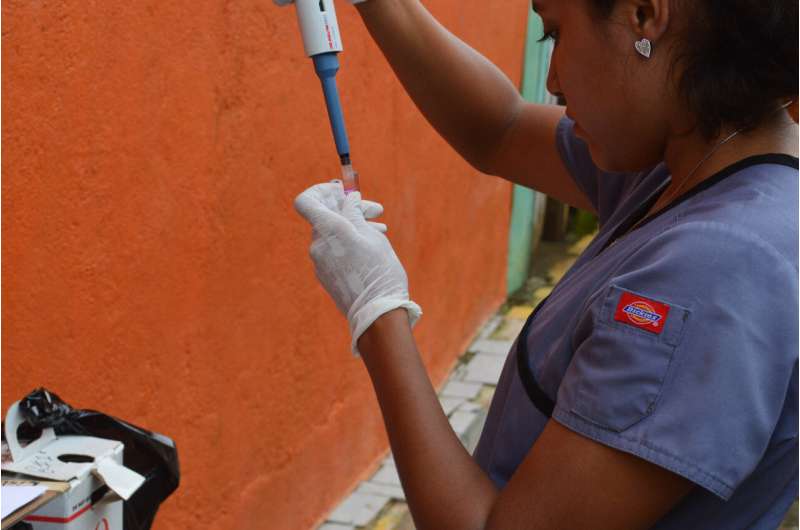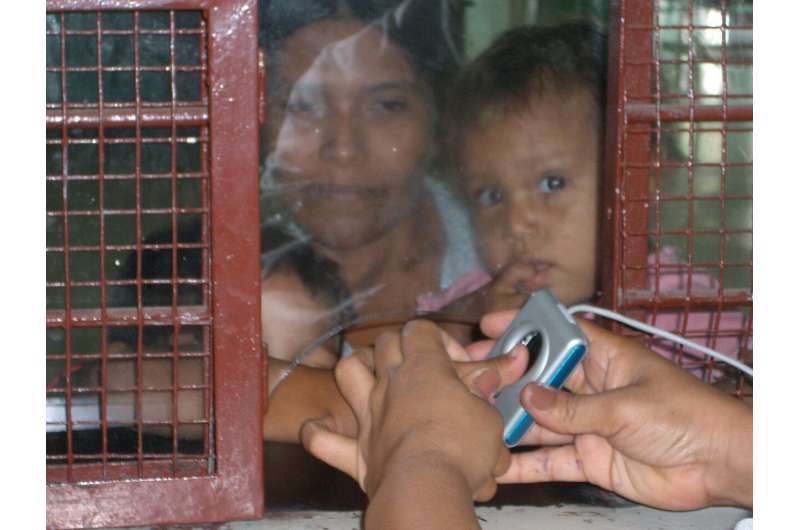November 19, 2021 feature
Secrets of antibodies: When it comes to dengue and Zika, dengue antibodies can knock out Zika—and vice versa

Cross-protective antibodies from dengue and Zika last far longer than previously thought, scientists have found in a massive study involving more than 4,000 children in Nicaragua.
The 11-year longitudinal analysis unexpectedly revealed that antibodies from either dengue or Zika—which naturally protect against infections caused by either virus—remain stable for years and do not precipitously wane.
Solving scientific mysteries about old foes such as dengue, and an emerging infection like Zika, helps lay the scientific groundwork for better responding to future outbreaks.
The sudden emergence of Zika virus in 2015 took the world off-guard as the medical community in multiple countries grappled with the explosive number of babies born with microcephaly—small head and brain size. Now, six years after the devastating epidemic, new data has begun to emerge about how the human immune system responds to dengue and its close viral cousin, Zika.
Results from the new longitudinal study could ultimately change how scientists understand natural immunity to dengue and Zika viruses, and additionally may inform future studies involving vaccine efficacy and efforts to predict and control outbreaks.
"We investigated antibody kinetics in 4,189 children up to 11 years after … multiple dengue virus and Zika virus infections in longitudinal cohorts in Nicaragua," wrote Dr. Leah C. Katzelnick of the division of infectious diseases and vaccinology at the University of California, Berkeley.
Dengue is endemic in Central America and elsewhere in the "dengue belt," a vast swath of the globe encompassing tropical and subtriopical regions. Often called dengue fever, the infection can cause muscle and joint pain, and in severe cases, internal bleeding and shock. Anyone who becomes infected a second time is at risk of severe manifestations. Zika, by contrast, had never been detected in the Western Hemisphere until it emerged abruptly in 2015. The mosquito-transmitted virus was particularly menacing among pregnant women and their unborn babies, although they weren't the only people at risk.
Katzelnick and colleagues reported results of their investigation in Science Translational Medicine, in which they underscored that their findings could influence how scientists and doctors understand the two infections going forward.
"It has been previously thought that initial infection with dengue or Zika [viruses] leads to antibodies that are initially protective but wane over time to a point where they become enhancing and drive severe disease," Katzelnick said, noting that earlier studies suggested that antibodies lost their neutralizing potency in about two years. In such instances, people may be vulnerable to infection by other dengue serotypes.
Writing in Science Translational Medicine, Katzelnick and her collaborators who hailed from Berkeley, the University of Michigan and the Sustainable Sciences Institute in Managua Nicargua, concluded that their findings open a new window of understanding about dengue and Zika viruses—and the human immune response to both of them.

Cross-reactive antibody protection became abundantly clear during the Zika epidemic of 2015, which swept through multiple Caribbean, Central and South American countries. Stunningly, the incidence of dengue disease dropped dramatically in the midst of the surging Zika outbreak. Dengue and Zika are members of the same family of flaviviruses, so patients who had recovered from dengue infections had cross-protective antibodies capable of neutralizing dengue and Zika. Both viruses are carried by Aedes aegypti mosquitoes.
Yet, previous studies had suggested that the cross-reactive antibodies lasted only two years before dropping to levels that actually made future dengue infections more likely. Scientists in 2015 also had recognized—at least anecdotally—that some people surprisingly had immune protection against the newly emerged Zika virus.
Katzelnick and colleagues designed a study that allowed them to track antibody responses to initial and secondary dengue as well as to Zika infections. The team focused on community-based and hospital cohorts of children in Nicaragua. To their surprise, instead of diminishing, the antibody kenetics research allowed the scientists to conclude that cross-protective antibodies remained stable for as long as 11 years.
It's important to note, models had predicted that these antibodies had an extremely long half-life in the community cohort, but the antibodies gradually waned in children with secondary dengue virus infections.
The research involved examining multiple dengue serotypes, defined in the analysis as serotypes 1, 2, 3 and 4. A first dengue viral infection is thought to induce antibodies that wane over two years to levels so low that protection is subpar and subsequent dengue disease likely. However, secondary dengue infection with a different serotype is thought to induce stable, cross-serotype protective antibodies.
To better understand antibody activity, scientists used a dengue inhibition enzyme-linked immunosorbent assay (iELISA), which measures antibodies associated with protection against dengue and Zika disease.
"Unexpectedly, we found that overall dengue virus iELISA titers stabilized by eight months after primary dengue infection to a half-life longer than a human life and [then] waned," Katzelnick and colleagues reported in the journal.
The half-life, which is longer than a human life, was estimated at 130,000 years, according to the team's research.
The team also observed cross-protective antibodies that were similarly stable in children who were infected with Zika virus. However, the amount of cross-protective antibodies differed across children, which suggests that the quantity of antibodies determines the degree of protection.
More information: Leah C. Katzelnick et al, Dengue and Zika virus infections in children elicit cross-reactive protective and enhancing antibodies that persist long term, Science Translational Medicine (2021). DOI: 10.1126/scitranslmed.abg9478
© 2021 Science X Network


















